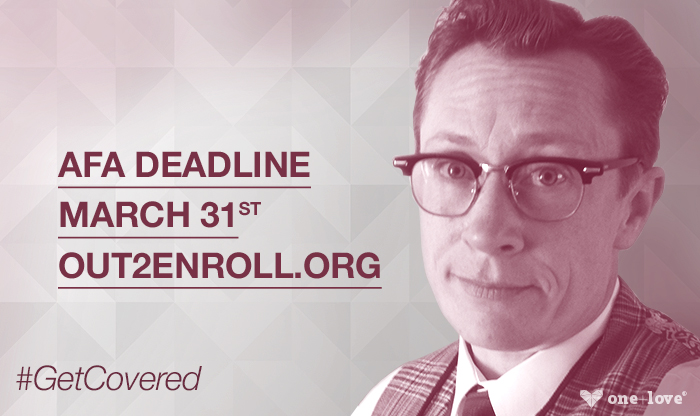
Dr. Scout On LGBTQ Health Equity and the Affordable Care Act
Dr. Scout is the director of the Network for LGBT Health Equity at CenterLink and an Adjunct Assistant Clinical Professor at Boston University School of Public Health. He is a frequent public speaker and cultural competency trainer who specializes in tobacco, wellness, transgender health, social determinants, health disparities, and surveillance. As director of the Network, he leads a team that provides a variety of technical assistance for state and federal health stakeholders and works to link local LGBT health advocates to each other (follow their activities on their blog).
Dr. Scout has been doing LGBT health policy analysis for over 10 years. He was named a Health Equity Champion by the CDC last fall as well as the National Youth Pride Services Advocate of the Year. In 2014 he looks forward to a Rockefeller Foundation writing residency in Italy where he’ll pen a series of op-eds about transgender health policy.
Dr. Scout is an openly transgender father of three kids, as well as a vegetarian and aficionado of bikeshare programs across the U.S. His opinions are his own and do not reflect his employer or funders. Contact him via Twitter: @scoutout.
What are some LGBTQ-specific things folks should know about the Affordable Care Act?
The Affordable Care Act (ACA) is actually one of the coolest things to happen to LGBTQ folk in years. Why? Because they’ve banned LGBTQ discrimination from any insurance provider who participates. It’s a pretty sad state of affairs that LGBTQ discrimination has been allowed in health for so many years, but the ACA might finally be starting to end that. Now, is this being uniformly applied? Not exactly yet. But the way we’re interpreting it is if there’s anything an insurance company is doing for non-LGBTQ folk, but they refuse to do it for us, then you should definitely lodge a complaint with the Office of Civil Rights at the U.S. Department of Health and Human Services. We know this Office is ready and waiting to jump in on these things. This new non-discrimination provision has the potential to affect trans folk who’ve been denied care for certain body parts, trans folk who’ve been denied mental health or hormones for being trans, and LGB folk who’ve been denied insurance altogether. Remember, if they provide this service for non-LGBTQ folk, it’s discrimination if they’re not offering it to us too!
I know you work on LGBTQ health equity issues. What are some of the barriers blocking the way to equity?
Sadly, we still spend a lot of our energy educating our own community about how we have such big health disparities. There’s so many folk who just think, “But we’re not biologically different, so why is our health different?” But we know most of health isn’t biology; it’s how people are treated that creates different health outcomes, and we’re treated worse than many folk from as soon as there’s some hint we’re LGBTQ — and there’s a host of health problems that follow. So that’s the biggest block, our own lack of knowledge. The LGBTQ communities have such amazing organizing around things like HIV that I know if we realized how much we had other health disparities — like how much more we smoked than the general population (our rates of cigarette smoking are 68% higher alone, and that’s our number one health burden) — we’d really organize and kick butt around those issues too.
What inspired the #getcovered campaign at Out2Enroll.org? Why do you think it was important?
Of all things, no lie, the feds reached out to the Sellers Dorsey Foundation and urged them to create something like Out2Enroll. We’ve been doing so much work with the feds they knew they needed to do tailored reachout to the LGBTQ communities or we wouldn’t trust these new health insurance exchanges. Think about it, half the stuff we hear from states or the federal government is anti-LGBTQ, like that we can’t get married or somesuch. So we have a real and warranted mistrust of the government. So the U.S. Department of Health and Human Services knew we wouldn’t trust the exchanges unless they reached out to us specifically. One of the reasons I loved Out2Enroll campaign was they launched it by having a big White House event with 200 or so reps from LGBTQ organizations — I think that was the largest LGBTQ health event I’ve been at in years, and it was at the White House!
Anything else you want to say?
I’ll be honest, it wasn’t easy for me to enroll in the health insurance exchanges — but trust me, it’s worth the hassle. Even if you’re insured already and make money, they can often offer cheaper rates, as in my case. The most important issue is that you have to try to enroll by Monday or else you can’t try again til next November. So, if you uninsured or underinsured, call your insurance exchange anytime at 1-800-318-2596, 24 hours a day — but do it by Monday. We all deserve good health insurance; if you won’t do it for yourself, call for all of us, because healthier LGBTQ people make stronger communities!

Recent Comments